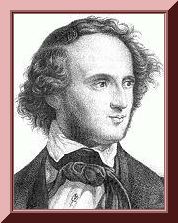 (born
Hamburg, 3 February 1809; died Leipzig, 4 November 1847).
(born
Hamburg, 3 February 1809; died Leipzig, 4 November 1847).
Of a distinguished intellectual, artistic and banking family in Berlin, he grew up in a privileged environment (the family converted from Judaism to Christianity in 1816, taking the additional 'Bartholdy'). He studied the piano with Ludwig Berger and theory and composition with Zelter, producing his first piece in 1820; thereafter, a profusion of sonatas, concertos, string symphonies, piano quartets and Singspiels revealed his increasing mastery of counterpoint and form. Besides family travels and eminent visitors to his parents' salon (Humboldt, Hegel, Klingemann, A.B. Marx, Devrient), early influences included the poetry of Goethe (whom he knew from 1821) and the Schlegel translations of Shakespeare; these are traceable in his best music of the period, including the exuberant String Octet op.20 and the vivid, poetic overture to "A Midsummer Night's Dream" op.21. His gifts as a conductor also showed themselves early in 1829 he directed a pioneering performance of Bach's "St. Matthew Passion" at the Berlin Singakademie, promoting the modern cultivation of Bach's music.
A period of travel and concert-giving introduced Mendelssohn to England, Scotland (1829) and Italy (1830-31); after return visits to Paris (1831) and London (1832, 1833) he took up a conducting post at Düsseldorf (1833-5), concentrating on Handel's oratorios. Among the chief products of this time were "The Hebrides" (first performed in London, 1832), the G Minor Piano Concerto, "Die erste Walpurgisnacht", the Italian Symphony (1833, London) and "St. Paul" (1836, Düsseldorf). But as a conductor and music organizer his most significant achievement was in Leipzig (1835-47), where to great acclaim he conducted the Gewandhaus Orchestra, championing both historical and modern works (Bach, Beethoven, Weber, Schumann, Berlioz), and founded and directed the Leipzig Conservatory (1843).
Composing mostly in the summer holidays, he produced "Ruy Blas" overture, a revised version of the "Hymn of Praise", the Scottish Symphony, the now famous Violin Concerto op.64 and the fine Piano Trio in C Minor (1845). Meanwhile, he was intermittently (and less happily) employed by the king as a composer and choirmaster in Berlin, where he wrote highly successful incidental music, notably for "A Midsummer Night's Dream" (1843). Much sought after as a festival organizer, he was associated especially with the Lower Rhine and Birmingham music festivals; he paid ten visits to England, the last two (1840-7) to conduct "Elijah" in Birmingham and London. Always a warm friend and valued colleague, he was devoted to his family; his death at the age of 38, after a series of strokes, was mourned internationally.
With its emphasis on clarity and adherence to classical ideals, Mendelssohn's music shows alike the influences of Bach (fugal technique), Handel (rhythms, harmonic progressions), Mozart (dramatic characterization, forms, textures) and Beethoven (instrumental technique), though from 1825 he developed a characteristic style of his own, often underpinned by a literary, artistic historical, geographical or emotional connection; indeed it was chiefly in his skilful use of extra-musical stimuli that he was a Romantic. His early and prodigious operatic gifts, clearly reliant on Mozart, failed to develop (despite his long search for suitable subjects), but his penchant for the dramatic found expression in the oratorios as well as in "Ruy Blas" overture, his "Antigone" incidental music and above all the enduring "Midsummer Night's Dream" music, in which themes from the overture are cleverly adapted as motifs in the incidental music. The oratorios, among the most popular works of their kind, draw inspiration from Bach and Handel and content from the composer's personal experience, "St. Paul" being an allegory of Mendelssohn's own family history and "Elijah" of his years of dissension in Berlin. Among his other vocal works, the highly dramatic "Die erste Walpurgisnacht" op.60 (on Goethe's poem greeting springtime) and the Leipzig psalm settings deserve special mention; the choral songs and lieder are uneven, reflecting their wide variety of social functions.
After an apprenticeship of string symphony writing in a classical mould, Mendelssohn found inspiration in art, nature and history for his orchestral music. The energy, clarity and tunefulness of the Italian have made it his most popular symphony, although the elegiac Scottish represents a newer, more purposeful achievement. In his best overtures, essentially one-movement symphonic poems, the sea appears as a recurring image, from "Calm Sea and Prosperous Voyage" and "The Hebrides" to "The Lovely Melusine". Less dependent on programmatic elements and at the same time formally innovatory, the concertos, notably that for violin, and the chamber music, especially some of the string quartets, the Octet and the two late piano trios, beautifully reconcile classical principles with personal feeling; these are among his most striking compositions. Of the solo instrumental works, the partly lyric, partly virtuoso "Lieder ohne Worte" (Songs Without Words) for piano (from 1829) are elegantly written and often touching.